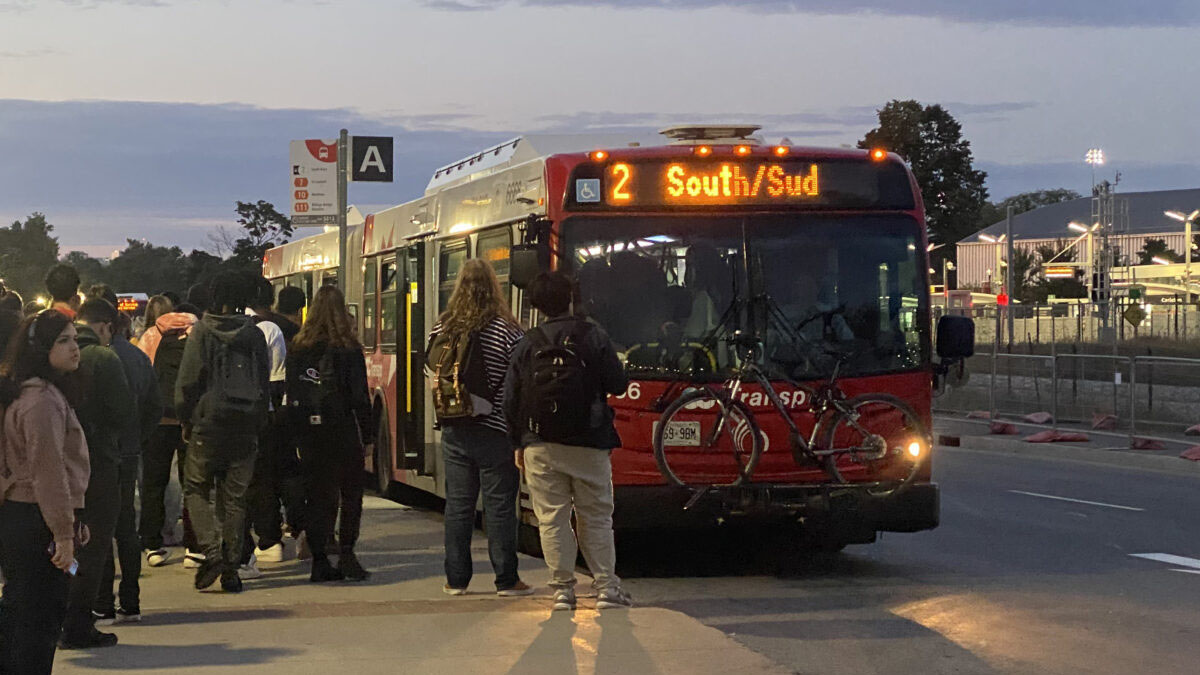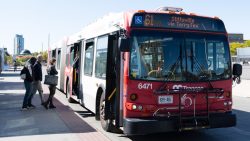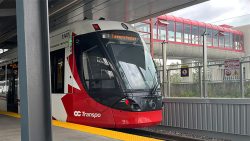University student unions in Ottawa were surprised to learn that OC Transpo plans to unilaterally increase U-Pass transit fees, a move the unions say violates a legal agreement.
Facing a projected $120 million transit shortfall in 2025, the city wants to bump fares by five per cent, impose a transit levy increase of eight per cent and reduce fare discounts for youth and seniors. OC Transpo is also proposing a five per cent U-Pass increase.
In a letter obtained by Capital Current sent to university administrations on Nov. 13, Pat Scrimgeour, the city’s director of transit customer systems and planning, said that should the city’s draft 2025 budget pass on Dec. 11, the U-Pass increase would take effect on Jan. 1.
But the city is contractually bound to a 2.5 per cent yearly increase, say student union representatives from Carleton University Students’ Association (CUSA) and the University of Ottawa Students’ Union (UOSU).
The city increase essentially asks the students “to violate our corporate bylaws as a federally incorporated not-for-profit,” UOSU president Delphine Robitailletold a recent Transit Commission meeting.
Even if they wanted to change the contract, it would be “impossible” and “illegal” to do so by January, Alex Stratas, UOSU advocacy commissioner, told Capital Current.
Any increase to student fees must be put to a referendum, which involves a lengthy process to ensure students are properly informed. It then needs to pass through a UOSU general assembly, which takes place in February or March of 2025.
The contract with the city also states there must be evidence that proper negotiation has taken place with all parties before fees can increase, Stratas said.
UOSU is in a unique position relative to other universities because they are an equal signatory to the U-Pass agreement, which means they have the same negotiating power as the university or OC Transpo.
Despite this, Scrimgeour’s letter wasn’t addressed to the UOSU, and they were not informed of it until two days after it was sent, says Stratas.
“This lack of notice serves to undermine the trust and respect that is integral to the continuation of our working relationship, and we are gravely concerned about this level of disregard for student representation,” Robitaille said during the commission meeting.
During the meeting, Coun. Stéphanie Plante and Coun. Sean Devine appeared surprised by the letter and asked questions about it. Other councillors indicated they were unaware of the January deadline, that negotiations clearly had to first take place with universities and that this increase was viewed as a “placeholder” in the draft.
Capital Ward Coun. Shawn Menard told Capital Current by email that he was “unaware of the contents of the letter as it was sent from OC Transpo.”
“City staff have been in contact with the four institutions to advise them of the draft budget provisions that would increase U-Pass costs by five per cent in 2025,” Scrimgeour told Capital Current, in an email. “Staff have engaged each post-secondary institution to discuss how this variation from the agreement would be documented and agreed upon. The proposed changes are not confirmed to take effect until City Council votes on the draft budget on Dec. 11.”
UOSU students are “under no obligation to entertain even a discussion on this matter” regardless of what OC Transpo wants, considering a contract is already in place, noted River Ward Coun. Riley Brockington during the meeting.
Students from Algonquin, Carleton, St Paul’s and uOttawa use the U-Pass, according to a recent open letter signed by CUSA and UOSU, among others.
“CUSA as an organization has made it very clear that we do not intend to put this to a referendum. We do not intend to go ahead with anything that’s above the current terms of the contract,” says Aidan Kallioinen, CUSA’s associate vice-president of government affairs. “To run a referendum without our support would be very challenging.”
The U-Pass contributes about $38 million a year to OC Transpo and represents between 19 and 27 per cent of OC Transpo’s total revenue, said Menard, who passed a motion at the Nov. 25 meeting that called for city consultation with the affected schools before their fall 2025 academic year.
The city is also asking students to accept a fee increase while they experience a significant decline in service, says Stratas, adding that when the U-Pass agreement was negotiated in 2010, Ottawa had one of the best transit systems in the country.
Alex Cullen, former city councillor and former transit committee chair, expressed similar sentiments during the meeting, stating that “raising transit fares is counter-productive in promoting public transit” and that ridership had begun to decline before the pandemic because of a pattern of continual fare hikes with service cuts.




